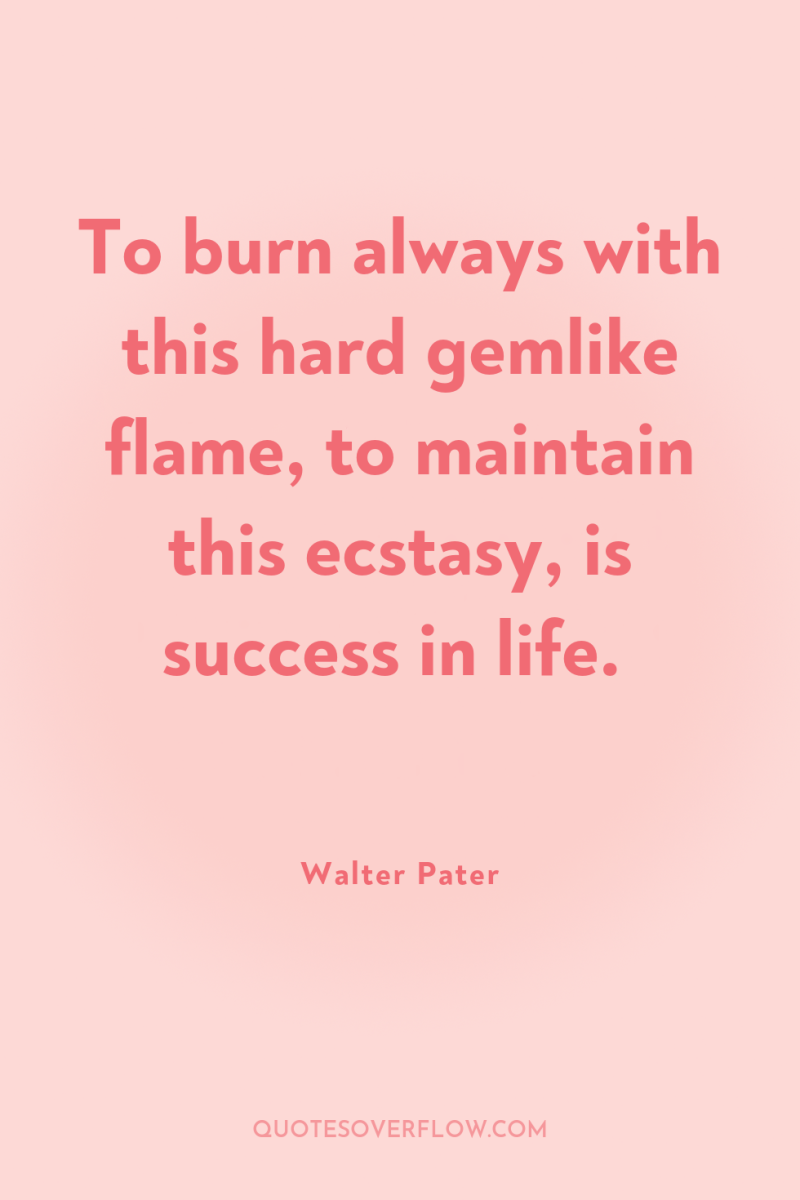
1
To burn always with this hard gemlike flame, to maintain this ecstasy, is success in life.Walter Pater
2
It is with this movement, with the passage and dissolution of impressions, images, sensations, that analysis leaves off–that continual vanishing away, that strange, perpetual weaving and unweaving of ourselves.Walter Pater
3
All art constantly aspires towards the condition of music. For while in all other kinds of art it is possible to distinguish the matter from the form, and the understanding can always make this distinction, yet it is the constant effort of art to obliterate it.Walter Pater
4
Analysis goes a step farther still, and assures us that those impressions of the individual mind to which, for each one of us, experience dwindles down, are in perpetual flight; that each of them is limited by time, and that as time is infinitely divisible, each of them is infinitely divisible also; all that is actual in it being a single moment, gone while we try to apprehend it, of which it may ever be more truly said that it has ceased to be than that it is. To such a tremulous wisp constantly reforming itself on the stream, to a single sharp impression, with a sense in it, a relic more or less fleeting, of such moments gone by, what is real in our life fines itself down.Walter Pater
5
To regard all things and principles of things as inconstant modes or fashions has more and more become the tendency of modern thought. Let us begin with that which is without - our physical life. Fix upon it in one of its more exquisite intervals, the moment, for instance, of delicious recoil from the flood of water in summer heat. What is the whole physical life in that moment but a combination of natural elements to which science gives their names? But these elements, phosphorus and lime and delicate fibres, are present not in the human body alone: we detect them in places most remote from it. Our physical life is a perpetual motion of them - the passage of the blood, the wasting and repairing of the lenses of the eye, the modification of the tissues of the brain by every ray of light and sound - processes which science reduces to simpler and more elementary forces. Like the elements of which we are composed, the action of these forces extends beyond us; it rusts iron and ripens corn. Far out on every side of us those elements are broadcast, driven by many forces; and birth and gesture and death and the springing of violets from the grave are but a few out of ten thousand resultant combinations. That clear, perpetual outline of face and limb is but an image of ours, under which we group them - a design in a web, the actual threads of which pass out beyond it. This at least of flame-like our life has, that it is but the concurrence, renewed from moment to moment, of forces parting sooner or later on their ways.Walter Pater
6
It is always hazardous to express what one has to say indirectly and allusively.Walter Pater
7
To burn always with this hard gemlike flame. To maintain this ecstasy is success in life.Walter Pater
8
To burn always with this hard gemlike flame to maintain this ecstasy is success in life.Walter Pater
9
Not to discriminate every moment some passionate attitude in those about us, and in the very brilliancy of their gifts some tragic dividing on their ways, is, on this short day of frost and sun, to sleep before evening.Walter Pater
10
All art constantly aspires towards the condition of music.Walter Pater
11
No account of the Renaissance can be complete without some notice of the attempt made by certain Italian scholars of the fifteenth century to reconcile Christianity with the religion of ancient Greece.Walter Pater
12
Not the fruit of experience, but experience itself, is the end.Walter Pater
13
At first sight experience seems to bury us under a flood of external objects, pressing upon us with a sharp and importunate reality, calling us out of ourselves in a thousand forms of action.Walter Pater
14
One of the most beautiful passages of Rousseau is that in the sixth book of Confessions, where he describes the awakening in him of the literary sense. Of such wisdom, the poetic passion, the desire of beauty, the love of art for its own sake, has most.Walter Pater
15
Art comes to you proposing frankly to give nothing but the highest quality to your moments as they pass.Walter Pater
16
With myself, how to pass time becomes sometimes the question - unavoidably, though it strikes me as a thing unspeakably sad in a life so short as ours.Walter Pater
17
To burn always with this hard, gem-like flame, to maintain this ecstasy, is success in life.Walter Pater
18
That sense of a life in natural objects, which in most poetry is but a rhetorical artifice, was, then, in Wordsworth the assertion of what was for him almost literal fact.Walter Pater